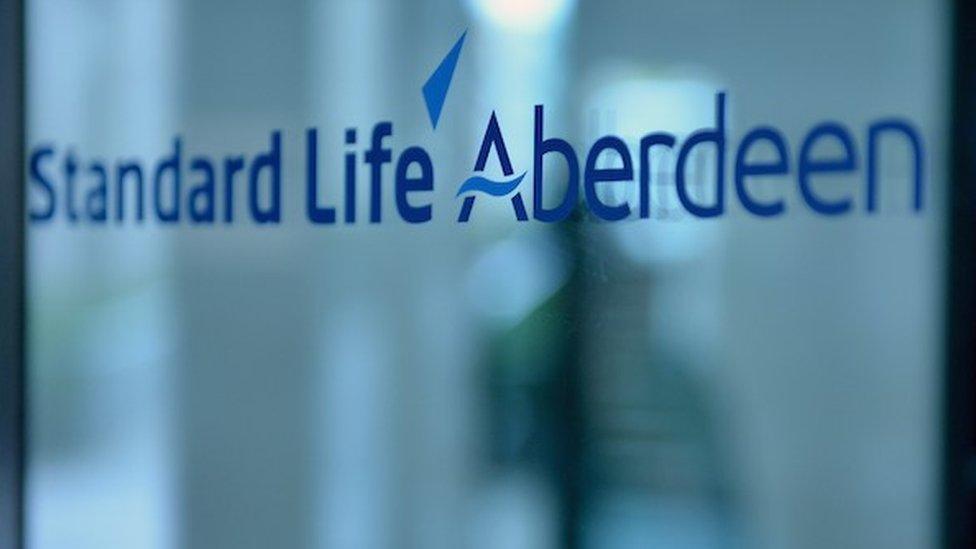Standard Life Aberdeen reports first-half profits fall
- Published

Standard Life Aberdeen has blamed "challenging" market conditions after reporting a continued outflow of funds.
The fund manager said £16.6bn left the business in the first half of the year.
Its assets under management and administration stood at £610.1bn, compared with £626.5bn for the same period in 2017.
Pre-tax profits from continuing operations fell 12% from a year earlier to £311m - below analyst expectations of £325m.
The Scottish fund giant was formed by the merger of Standard Life and Aberdeen Asset Management last year.
In its half-year report, the company said macroeconomic and political uncertainties continued to affect investor sentiment, driving investors to look for new strategies.
'New mandates'
Chief executives Martin Gilbert and Keith Skeoch said conditions for the asset management industry were "challenging".
They added: "Our investment and distribution teams are winning new mandates and we have a good and diverse pipeline of business from around the world.
"We are actively taking steps to improve our investment performance in key areas and are encouraged by the impact of these initiatives."
Meanwhile, the company also confirmed that it was accelerating plans to return £1.75bn to shareholders, adding that the first £175m tranche of its share buyback programme would begin "in the next few days".
The group announced the move in May, saying that it would follow the sale of its European insurance business to Phoenix Group.
The transaction is expected to complete in the third quarter.

Analysis by Douglas Fraser, BBC Scotland business/economy editor
"Challenging market" is a familiar euphemism for chief executives facing an uncomfortable ride.
And that's where job-sharing Martin Gilbert and Keith Skeoch appear to be, with the half-year results for Standard Life Aberdeen.
The share price is down since they merged, and they readily concede it is undervalued. The share buyback, of £1.75bn, is partly intended to give it a help upwards.
That money is partly made available by the sale of the insurance division to Phoenix, which will see around 3,000 people, mainly in Edinburgh, transfer to the new employer by the end of next month.
Shareholders are also benefiting from the successful float in Mumbai this week of the joint venture HDFC fund manager in India.
The Gilbert/Skeoch strategy is to focus on asset management in Edinburgh, with more than £600bn under management. The biggest asset manager in Europe, that should give them real clout.
But it has been losing ground. Instead of being bigger than the sum of the parts, they've become smaller. Assets Under Management have lost another £16bn net, to reach £610bn.
But as the chief executives say, they are facing a market that is "liquidity-driven". A lot of it is being driven towards tracker funds rather than the more expensive actively-managed ones.
Those who manage funds actively, carrying the cost of research, are finding "compression" of charges. Shareholders will be aware that's another euphemism, referring to the downward pressure on what Standard Life Aberdeen can charge in management fees, while rivals are cutting as low as zero (though read the small print carefully).
With fees compressed and a net outflow of funds, if the firm can't push up earnings, then the target of cutting its earnings ratio from 69% to 60% (slow progress in recent months) is going to require more than the £350m currently being taken out of its cost base.
- Published29 May 2018

- Published23 February 2018

- Published14 August 2017
